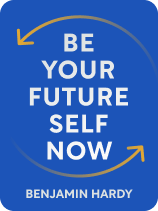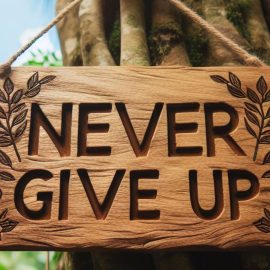

This article is an excerpt from the Shortform book guide to "Be Your Future Self Now" by Benjamin Hardy. Shortform has the world's best summaries and analyses of books you should be reading.
Like this article? Sign up for a free trial here.
What is Be Your Future Self Now by Benjamin Hardy about? What are the main takeaways of the book?
In Be Your Future Self Now, Benjamin Hardy argues that you should commit to becoming your higher self now. This means dedicating yourself to achieving the goals that will bring you to your fullest potential.
Read below for a brief overview of Be Your Future Self Now.
Be Your Future Self Now by Benjamin Hardy
In Be Your Future Self Now, Benjamin Hardy argues that achieving true success requires living up to your full potential—that is, becoming the highest version of yourself (what Hardy calls your “future self”). Anything short of this is a form of failure. However, becoming the person you want to be is one of life’s most difficult challenges—it requires knowing exactly who your higher self is, identifying the big, life-changing goals that will get you there, and dedicating yourself to those goals above everything else.
Hardy is an organizational psychologist specializing in entrepreneurial courage, transformational leadership, and exponential growth. While working on his Ph.D., Hardy ran an online training program and was a blogger with a readership of over 100 million. Since his graduation in 2019, Hardy has published multiple books, including Personality Isn’t Permanent, Willpower Doesn’t Work, and Slipstream Time Hacking. Hardy has also co-written several books with entrepreneurial coach Dan Sullivan, including The Gap and The Gain, Who Not How, and 10x Is Easier Than 2x.
The Importance of Your Higher Self
Hardy argues that the true measure of success in life is reaching your full potential, or in other words, becoming the highest version of yourself. To attain this goal, all of your present actions must move you toward becoming your higher self in some way, big or small. As a result, it’s crucial to identify your higher self as soon as possible because your goals and desires for the future drive your present actions.
Furthermore, if you have a clear, ambitious vision of the person you want to become, you’ll take productive actions in the present that will benefit you over time and move you toward becoming that self. By contrast, if you lack a clear, ambitious vision of your higher self, you’ll take unproductive present actions that will harm you over time and prevent you from becoming your higher self.
How to Become Your Higher Self
In the following sections, we’ll discuss Hardy’s four main recommendations for becoming the highest version of yourself and how to implement them.
Recommendation #1: Clearly Identify Your Higher Self and How to Become Them
Hardy says the first step in shaping your present actions to benefit you long term is to determine who you want to be. Imagine the happiest, smartest, most productive and successful version of yourself. Hardy emphasizes that your higher self must be based on what you desire most in life right now—not what society deems “successful” or what you think you should do.
To make your vision even clearer, identify the big, life-changing goals that your higher self has accomplished—these are what you must attain.
For example, imagine you’re an unemployed student who gets good grades and designs graphics in your free time. Your higher self is a renowned graphic designer who earned undergrad and graduate degrees, got stellar grades, has an impressive portfolio, has designed graphics for major companies, and has numerous contacts in the industry. These accomplishments are the goals you must achieve to become your higher self.
Recommendation #2: Prioritize Your Higher Self Daily
Next, Hardy argues that you should prioritize the actions that will move you toward becoming your higher self on a daily basis. This will ensure that you make consistent progress toward becoming your higher self and don’t get distracted by other urgent and important tasks, non-crucial activities, and instant gratification.
Recommendation #3: Seek Out Beneficial Environments
Next, Hardy recommends putting yourself in environments that will help you become your higher self. This is because we’re products of our environments—the situations we put ourselves in and the people we surround ourselves with impact who we are and what we achieve.
As a result, Hardy says you should step out of your comfort zone and associate with people who are better than you are so you learn to overcome challenges and acquire the skills and habits necessary to progress toward becoming your higher self. The following sections will explain why these two recommendations are important and how to follow them.
Recommendation #4: Have an Empowering View of Life and Fate
Finally, Hardy argues that many people fail to become their higher selves because they have a disempowering view of life and fate. Specifically, they believe they lack autonomy over who they are and who they can become because of three factors:
- Their past
- Their current circumstances
- An inability to control their fate
Hardy explores the roots of these three disempowering beliefs and the empowering beliefs to adopt instead:
- Don’t let your past dictate your future
- Take ownership of your circumstances and ability to change
- Believe that you’re the creator of your own fate

———End of Preview———
Like what you just read? Read the rest of the world's best book summary and analysis of Benjamin Hardy's "Be Your Future Self Now" at Shortform.
Here's what you'll find in our full Be Your Future Self Now summary:
- Why everyone must try to live up to their full potential
- How to identify your potential and the goals that will help you reach it
- Recommendations on how to become your highest self






